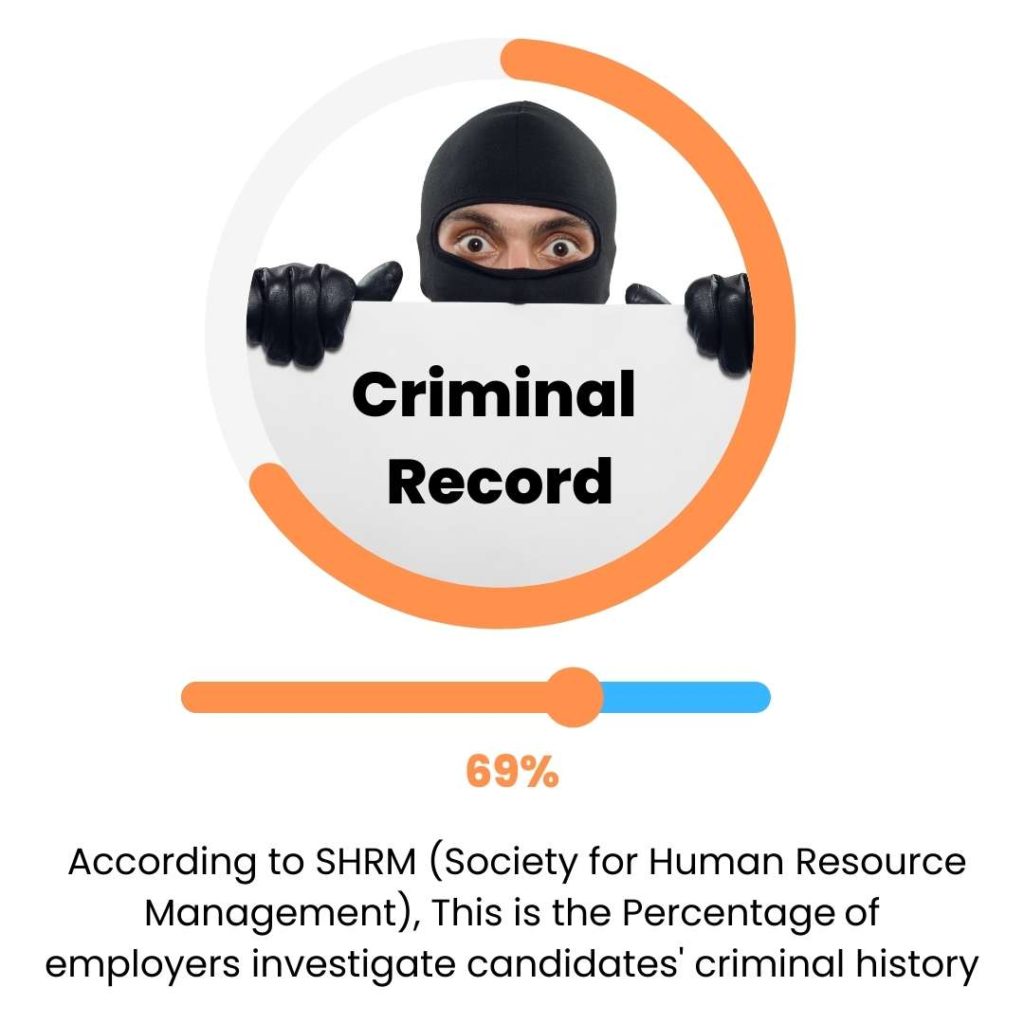
What Factors Should Organizations Consider Before Outsourcing Their Internal Audit Functions?
+91 1141182211 Outsourcing has become a strategic choice for many organizations looking to streamline operations, reduce costs, and enhance efficiency.

There are a number of factors to consider before recruiting a new employee for your firm. While skills, experience, and attitude should always be taken into account, it’s also critical that you conduct a criminal background check on your possible new hire. A criminal records check is part of the thorough background investigation that takes place before an applicant is hired. It checks numerous records available in the public domain to uncover the candidate’s criminal past, if any.
About 52% of businesses claimed they run criminal background checks to ensure that careless hiring is avoided. Surprisingly, in some places of India, criminal record checks indicated a 75 percent failure rate of candidates.
Employers all over the world include criminal background check questions in their job applications to verify the applicants’ criminal records. During the employment process, a criminal background check of potential hires aids companies in assessing job candidates’ antecedents.
To provide a truly secure workplace devoid of criminal intent, a thorough criminal records check becomes vitally necessary. With a criminal background check, you can be sure you’re hiring people with a clean record. This also involves searching the Litigate database. A litigation database check determines whether a candidate’s name appears in any proprietary or public database, such as a civil lawsuit database, criminal databases, and/or regulatory compliance database. Both Indian and international databases can be searched to see if the candidate has any ties to organized crime or has been referenced in any legal proceedings. When a competent professional agency does not do a criminal records check, such offenses can cause irreparable damage to a company’s reputation. According to a study, discrepancies linked to criminal records and references accounted for 19.5 percent of all discrepancies in India in 2016.

Every new employee should undergo a criminal background check to ensure that no criminals access your organization. A single inconsistency can have a negative influence on your workplace’s safety, motivation, and brand reputation. A criminal background check is required regardless of the hiring level!
In India, there is no law specifically dealing with criminal records or background checks. However, for conducting criminal records checks, the Indian Contract Act, Indian Penal Code, and Information Technology Acts of 2000 and 2005 are often used as benchmarks. Companies that fail to keep personal data obtained on employees confidential may face penalties under the Credit Information Companies (Regulation) Act of 2005.
Litigation-related information can also be found via the National Crime Records Bureau and the CBI’s Most Wanted Lists, in addition to district magistrate, state, and Supreme Court public records. The list of defaulters can be found in databases maintained by SEBI, RBI, the Registrar of Companies, and the Central Vigilance Committee’s list of corrupt officials.
It’s critical to seek advice from a reputable firm with access to indexed criminal records and litigation databases. It is critical to inform the candidate that a criminal records check will be conducted and secure his or her written consent before proceeding. In most cases, employers consult with background check companies to do thorough criminal background checks!
What methods do background check businesses use to search for criminal records?
Companies that conduct background checks often scan a range of sources, including local, state, and federal databases, as needed. While there are numerous sources available, the ones chosen will be determined by the exact searches that your prospective employer has requested.
One of the most prominent sources for criminal and offense history searches is state court records. While some municipal courts may make their documents searchable online, around 30% of courthouses require direct access in person. In order to assist in-person courthouse record searches in these jurisdictions, background check organizations execute real-time criminal records searches and maintain a network of court runners. As you might expect, such in-person searches take time, but they allow screening companies to get the most accurate and up-to-date information from the court.
In India, if a government employee has spent 48 hours or more in police custody, he or she will be automatically suspended. Any offence, including dowry killing allegations, might lead to such detention. Disciplinary committees and policies are established by private companies. After evaluating each case, they can decide on a course of action.
One of the most basic steps in recruiting the best individuals is to run a criminal background check. After a thorough investigation of the applicant’s background, a hiring decision should be made. Before making a hiring choice, it’s a good idea to offer the employee an opportunity to explain the negative finding.
The greatest criminal background checks are those that are accurate, thorough, quick, and obtained legally. The inclusion of criminal background check questions in the job application is the first step in conducting a complete criminal record check.
The checks can take a long time, cost a lot of money, and necessitate a lot of diligence. For interstate and international hires, the problems multiply. The HR manager should not let any financial or time restrictions allow the criminal background records check process to be shortened.
The criminal record check report received by the firm may be incomplete or erroneous due to the constraints inherent in the process. To protect the rights of employees/applicants, the law compels employers to give employees/applicants the option to present additional information to substantiate the report’s incompleteness or inaccuracy.
Individuals should be given a copy of the report and given enough time to respond with the requested additional information in the interest of fairness. If the people fail to provide the required information within the specified time frame, or if the information provided is insufficiently persuasive, the company might begin an adverse action procedure while keeping the individual informed. Individuals will then need to seek the respective judicial authorities for dispute resolution if they have any further grievances.
Employers can decide how far back they want the search to go, with seven years being the most popular option. Other options include ten years and “unlimited,” which looks for all reasonably available information. After the search is completed, the records that are shown in the report will be determined by how far back the search was conducted as well as any applicable legal constraints. Background check businesses can record criminal convictions indefinitely in most jurisdictions; however, certain states limit the reporting of convictions to seven years.
A number of factors are considered when determining whether a record is within the seven-year timeframe, including the date of conviction, release, or parole. Many screening businesses examine these similar variables, as well as periods of probation when deciding whether to publish a conviction record that can legally be reported indefinitely but the customer has requested a fixed (e.g., seven-year) time limit.
In terms of non-conviction, most background check agencies are unable to report anything older than seven years (such as non-pending records of arrest, criminal case dismissals, etc.). Non-convictions, on the other hand, are not required to be reported in a few states.
A criminal record check allows you to make an informed decision regarding a candidate’s appropriateness and fit for your organization. Even though a conviction does not automatically disqualify a candidate, you will be in the best position to determine whether their criminal history poses an unreasonable risk to your organization.
Like this article?
More To Explore

What Factors Should Organizations Consider Before Outsourcing Their Internal Audit Functions?
+91 1141182211 Outsourcing has become a strategic choice for many organizations looking to streamline operations, reduce costs, and enhance efficiency.

Outsourcing Internal Audit: Evaluating the Upsides and Downsides for Your Organization
+91 1141182211 In today’s dynamic business environment, companies face increasing pressure to enhance efficiency, manage risks effectively, and ensure compliance

A Background Verification Guide: Frequently Asked Questions and Their Answers
+91 1141182211 Background verification (BGV) is a crucial process used by employers to ensure they are hiring candidates with accurate